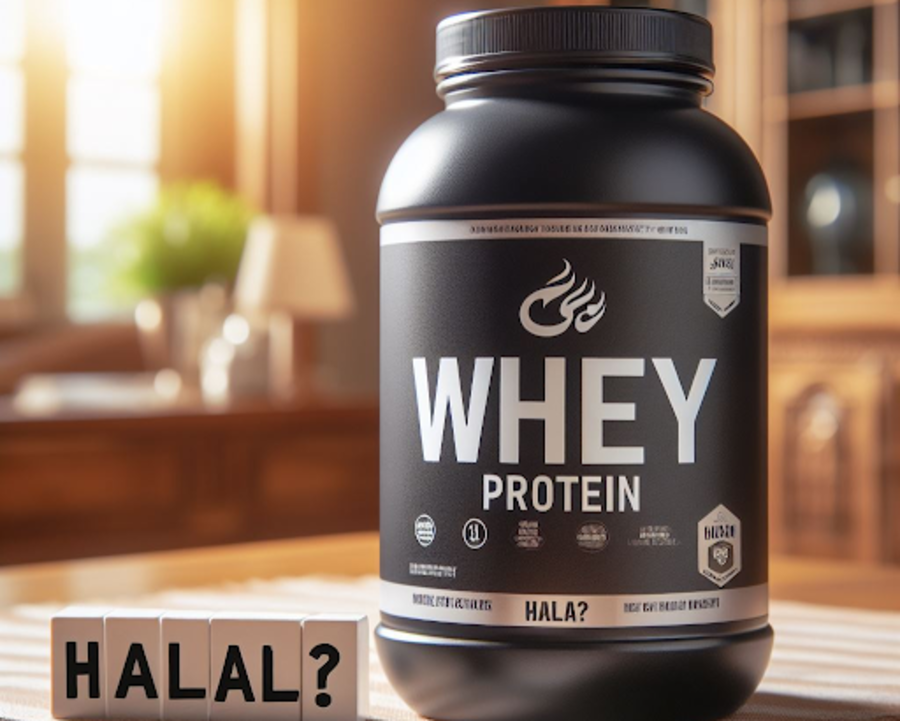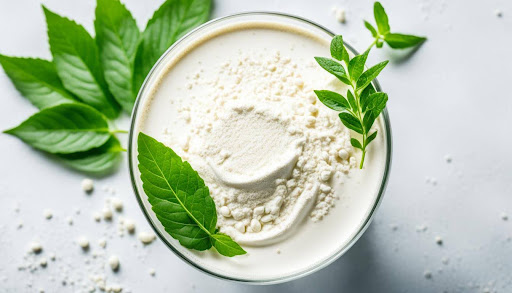Is Whey Protein Halal? Ultimate Guide for Muslims

When it comes to fitness and nutrition, whey protein is a popular choice for many. But for Muslim consumers, one important question arises: Is whey protein halal? Are there specific halal criteria and certifications to look for when choosing protein supplements? Let's dive into the world of whey protein and explore its halal status.
Whey protein, known for its muscle-building benefits, is derived from the liquid left behind during the cheesemaking process. However, not all whey protein powders are halal. The halal status of whey protein depends on the source of the rennet used during the cheesemaking process. But what exactly is rennet, and how does it affect the halal certification of whey protein?
In this comprehensive guide, we will explore the process of cheesemaking, the role of rennet, and the different sources of rennet that can determine whether whey protein is halal or haram. We will also discuss the importance of halal certification bodies, how to identify halal whey protein products, and the religious considerations that Muslims should keep in mind when selecting protein supplements. So, let's get started on our journey to uncover the halal status of whey protein!
Key Takeaways:
- Whey protein's halal status is determined by the source of the rennet used during the cheesemaking process.
- Rennet can be derived from animals slaughtered according to Islamic law or from plant sources.
- Halal certification bodies play a crucial role in ensuring the halal status of whey protein products.
- Muslim consumers should look for halal certification labels and avoid haram ingredients in protein supplements.
- By understanding the halal status of whey protein and identifying halal-certified brands, Muslims can confidently incorporate whey protein into their diet and fitness routine.
Understanding Whey Protein and Its Halal Status
When it comes to whey protein, understanding its halal status is crucial for Muslim consumers. In this section, we will delve deeper into the process of whey protein production and the factors that determine its halal certification.
The Cheesemaking Process and Whey Derivation
Whey protein is derived from the liquid leftover during the cheesemaking process. After the milk is curdled and separated into curds and whey, the whey undergoes further processing to isolate the protein. This process involves the use of enzymes to separate the whey from the curds.
Rennet: The Critical Factor for Whey's Halal Certification
Rennet plays a critical role in determining the halal certification of whey protein. Rennet is an ingredient used to coagulate milk during the cheesemaking process, aiding in the separation of curds and whey. It can be derived from animals, such as calves or lambs, or from plants.
Plant vs Animal Sources of Rennet
When it comes to halal compliance, the source of rennet is of utmost importance. If rennet is derived from an animal that has been slaughtered according to Islamic shariah law, or from a plant source, then the whey protein is considered halal. Common plant sources of rennet include the fungus Mucor miehei or Rhizomucor miehei.
Ensuring Halal Compliance in Whey Production
To ensure halal compliance in whey production, manufacturers must use halal-certified rennet and adhere to strict production guidelines. This involves sourcing rennet from halal-certified animals or plant sources and implementing rigorous quality control measures throughout the manufacturing process.
By understanding the cheesemaking process, the critical factor of rennet, and the importance of halal compliance in whey production, Muslim consumers can make informed choices and select whey protein products that align with their religious dietary considerations.
Identifying Halal Whey Protein Products
When it comes to selecting whey protein products that are compliant with halal dietary guidelines, there are several factors to consider. In this section, we will explore the role of halal certification bodies, highlight halal certified whey protein brands and products, discuss labels and certifications to look for, and emphasize the importance of avoiding haram ingredients in protein supplements.
The Role of Halal Certification Bodies
Halal certification bodies play a crucial role in ensuring the halal status of whey protein products. These organizations provide certification and supervision throughout the production process to ensure that manufacturers adhere to halal standards and requirements. Their thorough examination of the production methods, ingredients, and facilities helps to guarantee the authenticity and integrity of halal whey protein products.
Halal Certified Whey Protein Brands and Products
When searching for halal whey protein, it is essential to look for brands and products that have obtained halal certification from reputable organizations. Halal certification labels on whey protein products serve as a reliable indicator that they have undergone strict evaluation and have been proven to meet the halal requirements. Some halal certified whey protein brands and products in the market include Musashi. These brands are dedicated to providing Muslims with high-quality, halal-compliant protein supplements.
Labels and Certifications: What to Look For
To ensure that a whey protein product is halal, it is crucial to carefully examine labels and certifications. Look for clear indications that the product has been certified as halal by a recognized certifying body. These may include specific halal certification logos or text that explicitly states the halal status of the product. Additionally, labels should clearly list all ingredients, allowing you to identify any potentially haram substances or additives. By thoroughly reviewing labels and certifications, you can make informed choices and select products that meet your halal requirements.
Avoiding Haram Ingredients in Protein Supplements
When selecting whey protein supplements, it is important to avoid haram ingredients that may compromise the halal status of the product. Common haram ingredients to watch out for include alcohol and animal-derived substances, such as gelatin or certain types of flavorings. By carefully examining labels and being aware of these ingredients, you can ensure that your protein supplements align with your halal dietary practices.
Now that we have explored the role of halal certification bodies, highlighted halal certified whey protein brands and products, discussed labels and certifications to look for, as well as emphasized the importance of avoiding haram ingredients in protein supplements, you are well-equipped to make informed choices and confidently select halal whey protein products that meet your dietary needs.

Is Whey Protein Halal
To determine whether whey protein is halal or haram, it is crucial to understand the source of the rennet used and ensure it complies with Islamic dietary guidelines. Whey protein is permissible in Islam if the rennet used is derived from a halal source, either from an animal slaughtered according to Islamic law or from a plant source. Islamic rulings and guidelines provide clarity on the consumption of whey protein for Muslims. Muslims who adhere to a halal diet can safely consume halal-certified whey protein products.
When considering the halal status of whey protein, it is important to look for halal certification labels on the product packaging. Halal certification bodies play a crucial role in ensuring the halal status of whey protein products, providing certification and supervision throughout the production process. By choosing whey protein products with halal certification labels, Muslims can have confidence that they are consuming products that meet the Islamic dietary guidelines.
Islamic dietary restrictions emphasize the importance of consuming halal food and avoiding haram ingredients. Whey protein supplements may contain additives, flavorings, or processing aids that may not comply with Islamic dietary guidelines. Muslims should carefully read labels and avoid whey protein products that contain haram ingredients, such as alcohol or non-halal additives.
When incorporating whey protein into a halal diet, it is essential to consider the overall dietary balance. Muslims should focus on consuming a variety of halal protein sources, including plant-based proteins, to meet their nutritional needs. It is recommended to consult with a qualified nutritionist or religious authority to ensure adherence to Islamic dietary guidelines.
Conclusion
Whey protein can be halal if the rennet used in its production is sourced from halal-certified animals or plants. Muslims should look for halal certification labels and avoid haram ingredients in protein supplements. Halal certification bodies play a crucial role in ensuring the halal status of whey protein products. It is important for Muslims to make informed choices and prioritize halal options when consuming whey protein supplements. By understanding the halal status of whey protein and identifying halal-certified brands, Muslims can confidently incorporate whey protein into their diet and fitness routine.







![[HBC1] Hammer Energy Gel - Easy Energy During Exercise (Chocolate, 1 Serving)](/web/image/product.product/1258/image_256)
![[WP24] Whey Protein Powder (Unflavored)](/web/image/product.product/3859/image_256)